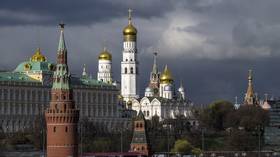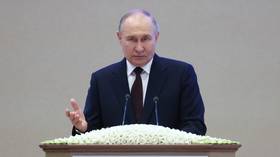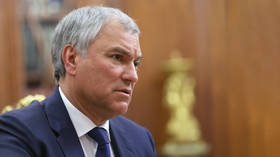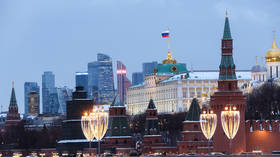Ukraine should review Zelensky’s legitimacy – Kremlin

The legitimacy and status of Ukraine’s Vladimir Zelensky remain unclear since his official term as the country’s head of state expired last week, Russian presidential spokesman Dmitry Peskov told journalists on Wednesday.
Presidential elections were scheduled to take place in Ukraine on March 31. Zelensky canceled the vote along with all other elections back in December 2023, citing martial law and the continuing conflict with Russia. He also announced at that time that no new polls were to be held during wartime.
When asked about the Ukrainian leader’s legitimacy, Peskov said “a discussion on the issue is currently going on,” and “divergent opinions” had been voiced on the subject. According to the Kremlin spokesman, it is a matter primarily for Ukraine itself to provide a legal assessment of Zelensky’s status in accordance with its own legal system. For now, news media outlets could refer to Zelensky as they see fit, he added.
Earlier this week, Russian President Vladimir Putin also called for a deep legal analysis of Zelensky’s status. He said the Ukrainian constitution does not say anything about either the extension of the presidential powers or suspension of presidential elections. He also suggested that the Ukrainian parliament – the Verkhovna Rada – was the only legitimate authority in Ukraine, since the extension of its powers during martial law is clearly established in law.
Ukraine’s constitution limits a presidential term to five years and says no person can hold the office more than two consecutive terms. It lists circumstances in which presidential powers could be terminated early, and states that “a president of Ukraine exercises their powers until a new one takes office.” However, it does not explicitly say anything about the extension of those powers, including during martial law.
In the case of the Verkhovna Rada, however, Article 83 of the nation’s basic law explicitly states that “its powers shall be extended” if its tenure expires during a period of martial law.
Zelensky himself has previously cited martial law as the reason for the extension of his mandate, arguing that no presidential elections can be held during wartime.
Ukraine’s Martial Law Act does prohibit holding any presidential, parliamentary or local elections while it remains in force. The same law also states in Article 10 that the presidential powers as well as those of the parliament and other state bodies “cannot be terminated” as long as martial law is in place. It is, however, unclear how exactly this article should be interpreted in light of the Ukrainian constitution.
Earlier this week, Putin suggested that Ukraine’s Western backers could be keeping Zelensky in place to blame him and his government for all the “unpopular decisions” taken by Kiev before replacing them with someone else.














